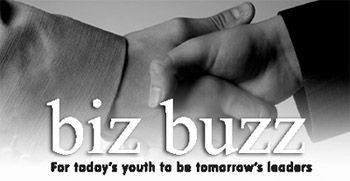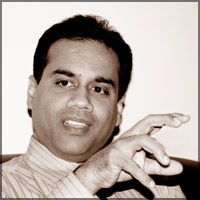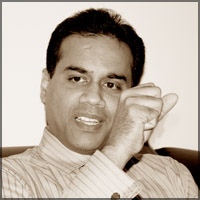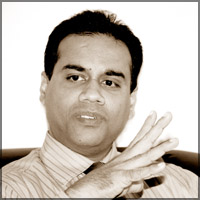 Diversified profile is important Diversified profile is important
By Panchamee Hewavissenti
Kishu Gomes,Country Chairman, CEO/MD of Chevron Lubricants Lanka Ltd.
and Chevron Ceylon Ltd.
Q: Down memory lane, can you explain how you became what
you’re today?
A: I started my career as a ‘sales person’. Because I wanted
to excel in marketing field. I was impressed by prominent and key
personalities in society who were leading lives of affluence. I too
wanted to be admired by society and to be a kind of a hero.
I joined Coca Cola company and became an executive within 2 years. I
was then 21 years old. I had to shoulder many responsibilities than a
boy of my age.
My job was to handle special events. It was more entertaining. I got
an opportunity to mingle with high profile people such as business and
political leaders, top sports people, singers and actors. During eleven
years of working at Coca Cola, I engaged in sales and marketing. singers and actors. During eleven
years of working at Coca Cola, I engaged in sales and marketing.
After that I joined Caltex on 31st December, 1996 as a trainee
manager. I was privileged to be the first manager at Caltex
multinational company. From national sales manager, due to my hard work
I became the ‘head of sales and marketing’ within 3 years. Within a
short period I was promoted as the CEO of the Caltex company and I’m
still holding that responsible position.
Q: From starting a career as a sales person at Coca Cola to
being the CEO/MD of the Caltex multinational company, you might have not
probably walked on a rosy path. Explain how you are confronted with
challenges?
A: I faced challenges right throughout both personal and
career wise. I grabbed every opportunity to enhance my performance
without being demoralised by them. I also enjoyed taking risks.
Q: When you became the CEO/MD of Caltex multinational company,
did you stick to the methods used by your predecessors?
A: No. I always looked for new things. I never followed any
previous Director or a Manager but gathered experience from their past
performance and failures. I never followed norm or tradition of the
company. I wanted to innovate new strategies and ways.
Q: Explain about the formula you implemented for your success?
A: You should not look at you as a product. You should be able
to market yourself, managing yourself as a person with knowledge and
experience. In this world, business competitions are everywhere.
There’s a competition among individuals as well. This is analogous
to, for instance, in order to receive more attention from customers, a
commodity should a popular brand name, the product should also maintain
high quality standards. Likewise an individual too should have a value
for himself. An individual should be able to be more qualified than
others and should be able to grab the attention over others.
He should not be confined only to his job. He should explore many
paths, should be exposed to various fields to acquire knowledge. You
should have brand attributes and should nurture them constantly to
enhance performance. You should be able to see progress within yourself
on a daily basis.
Q: How did you apply that formula of success for your career
development?

A: I don’t limit myself to the core job. The profile I have
built is wider and more diversified than that of a traditional CEO. I’m
into various other things apart from my core job.
I want people to look upto me as a different person. My scope is
wider. Though I’m the CEO of the company,I am also a model. I have acted
in commercials. I sing, play guitar, do sports to keep myself fit. Also
conduct personality development and Youth Performance Enhancing
lectures.
This type of a diversified profile should hardly be found in a
typical CEO who is only confined to his job. This helps me to enhance my
performance and maintain a sound mental health which is the key to
personal development.
Q: You mean to say that confining yourself only to the job is
more stressful?
A: Yes of course. When the job becomes a person’s life, he is
unable to think out of that frame. Everything becomes his job. While you
are immersed in the job, you can use your creativity and abilities which
help to lessen the burden or displeasure caused by the job, which also
enhance your marketability.
You shouldn’t let work takeover your life. Establishing outside
interests will help you to keep you fresh and creative. If your scope is
only within your job. When you’re confronted with trouble and there’s no
way to get away with them.
Q: Do you agree with the fact that most business personalties
hardly possess such diversified profiles?
A: Yes. That’s because Sri Lankans are bearers and followers
of traditional way of doing things. That’s a very unproductive attitude.
I can take for example the late American president Ronald Reagan. He was
an actor too. People should eliminate that wrong attitude in them. So
that you can utilise all you competency to get maximum value out of you.
There’s a sinhalese saying ‘Loven Ekek Ek Deyakate Vei Samatha’ (one
person will excel in one craft). I disagree with that as a person has
various talents. As long as a person puts a little effort to find out
what his hidden talents are and try to enhance them and utilise them he
can increase his marketability.
Q: What are ‘career pyramids’?
A: Higher the level in the pyramid lower the number of job
opportunities.

The logic here is that higher the level of job, lower the number of
opportunities (jobs) available, hence greater the competition for
employees. For example, 200 staff grade jobs, 100 junior executives, 10
senior executive positions, 4 functional leadership positions and only
one CEO.
While at the lower levels differentiation comes largely on technical
competencies or core competencies, as you move up in the pyramid the
soft skills of the employees play a bigger role ( team work,
coordination and collaboration with others, creativity, new ideas,
winning together attitudes towards work, relationship skills, etc.)
Whereas at the senior levels, with the technical knowledge and
experience, one needs to have the highest level of foresight, strategic
thinking, execution, leadership, communication and people management
skills to win.
Another key aspect in today’s environment is that to win at higher
levels, employees need to build an individual profile that naturally
attracts attention from all stakeholders. This is an emerging art all
budding leaders have to learn. Personal branding is the way forward to
win in an ever increasing competitive job market. A personal brand
comprises two sets of attributes.
One - the rational attributes that make you qualify for the job in
terms of professional background and relevant experience and Two - the
emotional attributes that positions you well relative to others who
aspire to achieve the same level you desire. It is about amplifying your
image to be on top of mind to be the preferred choice.
Q: How Sri Lankans widen their horizon?
A: Global thinking is very important. It’s not sufficient to
compete only in Sri Lanka. You should determine what makes you win in
the global arena. You should empower yourself with the global
requirements. It’s advisable to do a self audit, assess yourself and
work hard to identify and fill those gaps.
When you seek to compete globally, you should be able to work with
different people and different cultures, perform under different
circumstances and in different industries. Because you might not know
which field you’ll excel in. Therefore knowledge in different industries
is a good thing for your future prospects. Because when you find an
opportunity you can grab it at once.
Q: What are your educational qualifications?
A: I did A/L in mathematics stream. I didn’t want to pursue my
higher studies, because as I said I had a passion to join one of the
Forces. Although in the latter part of my schooling I was really
inspired by my uncle who was a psychologist and became really interested
in studying psychology. I used to spend most of my time in my uncle’s
library reading books on various subjects. Thus I gathered a vast
spectrum of knowledge.
I joined Coca Cola right after my A/Ls and did my CIM and then read a
MBA from Lester College UK, while working at Coca Cola. I think along
with experience, we should have a sound educational background as well,
in order to have an edge over others.
Q: Don’t you experience stress when the work is piled up?
A: Not really. If I confine myself only the position of CEO, I
would probably have undergone stress. Since I enjoy a diversified
schedule, and do things that I love, I hardly experience stress. I lead
a simple and natural way of life. Since I have a proper time management.
I don’t have problem in piling up of work.
Q: Your sports background?
A: After I dropped out from the school (Prince of Wales -
Moratuwa). I planned to join one of the Forces. Because I possessed a
sound sports background. I was a ruggerite and an athlete. My pet even
was hurdles. I was a National Schools Hurdles Champion, 100 metres
Colombo District Champion and played rugby as a wing three quarter. When
I was schooling, I spent more time in the ground than in class room.
That’s, I think the reason behind why I was determined to join one of
the forces. Another inspiration for me was that there was a big demand
to join the forces and many of my friends got an opportunity to join the
forces.
Q: What’s your notion on “serve the country before yourself?”
A: I have to disagree with it. Because how can you serve the
country, if you are unable to serve yourself. This traditional way of
thinking has been passed onto today’s youth through many generations.
First you should be able to stand on your feet. You should be
independent. When you are able to serve yourself, then you can serve
your family, then your village and then the country. That should be the
sequence. Not at one step, the country. For example, a new born child
cannot get up and walk at first. It takes time, to turn to side, crawl,
creep and turn stand up and then walk.
Though the youth are often taught to ‘serve the country first’ they
don’t know how. The youth should be taught to serve themselves first in
order to serve the country. The youth should be educated, exposed to
various types of experience and knowledge. When your are able to be
independent you can extend your service to the country. How can a person
who is unable to stand on his feet helps to develop the country. |
